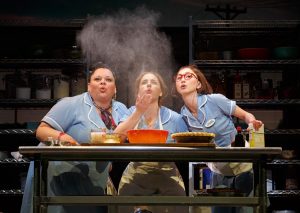Waitress the musical is yet another show that’s based on a movie, an important detail to note though is the fact that this musical is based on a relatively unknown indie-movie. Being relatively unknown gives the creatives of a show more space to work with, as fans of the property are more likely to be happy with the exposure to said property than dissatisfied with the changes made to it. This story of female empowerment in particular was used to become one of the few overtly feminist musicals.
The musicals starts out in a Diner somewhere in a rural village in one of the southern States of America. Three ladies are working at the diner: Becky, who has seen it all and just wants to enjoy life for what it brings, Dawn who is desperate for love but also really picky and precise in choosing who she wants to love, and finally Jenna. Jenna is the girl who bakes the pies for the diner, and she is in an abusive marriage with her high-school sweetheart. She wants nothing but to get out of the relationship, but unfortunately for her she gets pregnant with his child. The situation gets significantly more complicated when she starts having an affair with the married gynecologist Dr. Pomatter. She eventually figures a way out, but can she keep all the secrets she needs to keep for her plan to work?

For a story that is all about feminism this musical isn’t too keen on breaking any stereotypes. All the men in this show, except for two, get into extra-marital affairs, and the other two? One is an abusive husband and the other one seems to be a stalker. It’s also strange that the text, especially in this day-and-age, doesn’t give a reasonable argument for Jenna to keep the baby. Not even a personal reason for the character. It could have been an opportunity for the creative team to either take a stand or to make a statement that supports women that do choose to keep their baby. What this show does do right though, is tell the story of a woman that has been pushed around and who in the end is finally ready to pick up her own life.
The music is also more than just a vehicle for the story and lyrics, it’s used throughout the production to set the mood of certain scenes or to create tension and relief within the choreography.
The music and lyrics are written by Grammy-nominated singer Sara Bareilles, and they really are the star of the show. The melodies that she has penned for this musical give a proper tone and feel to the songs. They might be a bit saccharine in some but it suits the overall show. The music is also more than just a vehicle for the story and lyrics, it’s used throughout the production to set the mood of certain scenes or to create tension and relief within the choreography. The music also allows for a range of emotions to be poured into them by the performers. The book by Jessie Nelson works perfectly well in tandem with the music to tell the story in the best way possible. You can tell that Diane Paulus, the director, had a very clear way of telling the story in mind, as is reflected in the set and lighting design. The set and lighting are at times realistic and at others a little more abstract. The contrast between the two creates different kinds of focus for the audience and makes them more aware of what is happening in certain scenes.

What really helps the elements come together is the cast. You can see that the actors really get the director’s intention when they are playing the characters. The people within this world are almost real people but their quirks and flaws are pulled a little more outward to create a more clearly defined character. Caitlin Houlahan for example is the epitome of cuteness as Dawn, she’s neurotic and a perfectionist but Caitlin adds a little love in there as well which makes her a very likeable character. This is in contrast with NaTasha Yvette Williams’ Becky though, who NaTasha performs as a rough-and-tough woman who has seen enough of the world to laugh at it. But the biggest acting challenge in this show is Jenna, and I have to give props to Jordin Sparks (the 2007 winner of American Idol) for the way she portrayed her. She has to play a woman who feels trapped because she is pregnant with the child of a dominating husband and she has to be able to show the progression of the character from that moment until the end of the play where the baby, instead of being a burden, becomes the very thing that pushes her to leave her husband. A lot of women have already portrayed Jenna and a lot of women have, in my opinion, not been able to grasp the gravity that comes with the character as becomes painfully clear in the multiple versions of ‘She Used To Be Mine.’ That song is Jenna’s power ballad at the end of the play and a lot of actresses take this song as the opportunity to show off their vocal range while they should be using their acting range to show in what kind of mental state Jenna is at the moment. Jordin Sparks, as opposed to some of the actresses that came before her, knows how to balance both vocal clarity and acting prowess to create a very likable, realistic but above all fragile Jenna. I applaud her for that.
While I would have appreciated this show more if it had been a little bit more conscious of the political message it generates, I also accept the fact that this is probably the best they could have done. They were probably more keen on telling the best musical version of the story from the film than they were aware of the political impact it would have on the audience. And if the adaptation generates this good of a product, I can respect that decision.
seen at: the Brooks Atkinson Theater / seen on: 9/22/2019
BOOK: Jessie Nelson, MUSIC & LYRICS: Sara Bareilles
Based upon the motion picture written by Adrienne Shelly
SET DESIGN: Scott Pask, COSTUME DESIGN: Suttirat Anne Larlarb
LIGHTING DESIGN: Christopher Akerlind, SOUND DESIGN: Jonathan Deans
WIG & MAKE UP DESIGN: Rachel Padula Shufelt & Jason Allen, MUSIC COORDINATOR: John Miller EXECUTIVE PRODUCER: Alecia Parker, GENERAL MANAGER: B.J. Holt
ORCHESTRATIONS: Sara Bareilles & The Waitress Band, MUSIC SUPERVISION & ARRANGEMENTS: Nadia DiGiallonardo
CHOREOGRAPHER: Lorin Latarro, DIRECTOR: Diane Paulus


